« April 2008 | HOME PAGE | June 2008 »
May 29, 2008
After Quake, Criticism Returns
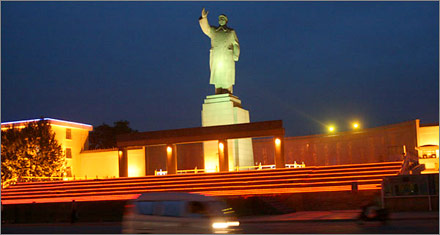
I'm not the first person to observe that China's pre-earthquake troubles more or less vanished in the week or two after the disaster in Sichuan. Torch relay? Tibet riots? CNN? Xinjiang protests? The list of issues threatening to disrupt the harmonization of the pre-Olympic atmosphere kept growing bigger, and bigger, and bigger... until, poof!
It's sort of like the U.S. being pulled out of the Great Depression by World War II... no one wanted a World War — or the deaths of tens of millions of people — but we were sure glad to say goodbye to tent camps for the homeless in Central Park.
There are some signs, though, of a return to normalcy in the international back-and-forth between China and the West. Senator Sherrod Brown (D-Ohio) last week authored an unusually strongly worded resolution calling on China to release Uyghur political prisoners and to preserve Xinjiang's cultural and linguistic heritage:

Etcetera, etcetera, etc.
Sorry for the long image, but there are pages and pages more where that came from if you feel like reading the complete text. Senator Brown also spoke after the resolution was entered into the record, first acknowledging the devastation of the earthquake and then quickly turning to criticism of the Chinese government.
My prayers are with the people of Sichuan Province and all those brave men and women who are there now providing support as volunteers, especially providing support to the Chinese people in Sichuan Province.
I wish to focus on something else in China. This isn't the Chinese people, it is the actions of a few people at the top of the Chinese Government—actions we must confront.
If you ask me, the resolution was introduced at a strange time, unless the Senator was looking to fulfill some responsibility with a minimum of attention. Was this a case of something being buried when no one was looking?
Also, the Senator made a statement of questionable accuracy when he said:
As China rolls out the red carpet to welcome hundreds of thousands of tourists and as Olympic-related media flock to Beijing to watch the events, no one will be allowed to go to Tibet, no one will be allowed to go to the Xinjiang Uyghur Autonomous Region, no one will be allowed to see the hundreds of political prisons, no one will be allowed to visit the areas of China where hundreds of millions live in abject poverty.
The question of tourism in Tibet is still unsettled, but I've never heard of any restrictions on travel to Xinjiang. And areas of the country where "abject poverty" exists? As anyone who's traveled outside of Beijing or Shanghai knows, that's most of China. Last I checked, poor farming and mining villages were still accessible.
I've got to give the Senator credit for one thing: U-Y-G-H-U-R. That's my personally preferred spelling for the major minority ethnic group living in Xinjiang, although U-I-G-H-U-R is more common.
Also, check out Nick Kristof's op-ed piece today from Kashgar, in which he's trailed by the PSB and ends up surprised by the lack of intense antipathy towards the Han felt by most Uyghurs:
“Nobody likes it when the Chinese all move in here,” said a Uighur shop-keeper. “Of course, we’re all upset. But what can we do?”
One young woman offered a different take. “When I was a little kid, my mom would tell me, ‘Don’t wander or the Han Chinese will steal you away. They eat human flesh.’ ” She laughed and added: “But now we see more Han, and we’re not afraid of them. Relations are O.K.”
Some young Uighurs criticized the Beijing Olympics, saying the Games will drain local budgets. But I could have found stronger anti-government sedition on any street corner of Manhattan.
You can read the text of Sen. Brown's speech about Xinjiang below. Please don't take my posting of S. RES. 574 and Brown's remarks as an endorsement of his sentiment. All I want is to provide you with provocative information... and let you argue it out amongst yourselves.
••••
Sen. Sherrod Brown's speech after introduction of S. RES. 574
22 May 2008
Congressional Record
Mr. BROWN: Mr. President, the Chinese people have endured an unspeakable tragedy, as we know, with the loss of tens of thousands in a major earthquake. Those numbers continue to grow. On the radio this morning, I heard it looks like more than 50,000 Chinese people have died in one of the greatest tragedies of the last decade. My prayers are with the people of Sichuan Province and all those brave men and women who are there now providing support as volunteers, especially providing support to the Chinese people in Sichuan Province.
I wish to focus on something else in China. This isn't the Chinese people, it is the actions of a few people at the top of the Chinese Government—actions we must confront. When I say "only a few people at the top," the Chinese Government is called the People's Republic of China for a reason. It is a Communist government, a very top-line hierarchical system, where a few people at the top enjoy so much of the benefits and so much of the power and they wield that so unfairly and immorally and, many times, against so many in their country.
For us to ignore the behavior of the Chinese Government, to dismiss that behavior, to minimize that behavior is a reprehensible act on our part.
In a little more than 3 months, the world will witness one of its great quadrennial events—the summer Olympic Games. The games have been billed as a way for the host, China, to reintroduce itself—a new China, if you will—to the international community. And China has pulled out all the stops: $38 billion in infrastructure improvements, including a brandnew 91,000-seat stadium, 300 miles of new roads, and an entirely new terminal at Beijing's International Airport, all because of the Olympic Games.
What China will not be highlighting is its human rights record. That is because it is abysmally disgraceful.
As China rolls out the red carpet to welcome hundreds of thousands of tourists and as Olympic-related media flock to Beijing to watch the events, no one will be allowed to go to Tibet, no one will be allowed to go to the Xinjiang Uyghur Autonomous Region, no one will be allowed to see the hundreds of political prisons, no one will be allowed to visit the areas of China where hundreds of millions live in abject poverty.
Last year, Amnesty International—a no more respected and fairminded group in the world—said of China:
An increased number of . . . journalists were harassed, detained, and jailed. Thousands of people who pursued their faith outside officially sanctioned churches were subjected to harassment and many to detention and imprisonment. Thousands of people were sentenced to death of executed. Migrants from rural areas were deprived of basic rights.
The Presiding officer, from the State of Rhode Island, has talked passionately about the freedom of the press and journalism in countries where we have the kind of relationship we have with China and how important it is. Others in this body have talked about human rights and labor rights, and now China has violated those values we hold dear and that international organizations that serve all of the world hold so dear.
Beijing will continue to attempt to paint its repressive regime during the Olympics in the best light possible, as we have seen in the last month with the unnerving events in Tibet. The repression in Tibet, a region similar in its treatment by the government as the Xinjiang Uyghur Autonomous Region, is nothing new. For almost 60 years, Tibetans have survived under Beijing repression. Tibet was swallowed up by China in 1950. The Uyghur Autonomous Region was swallowed up by China the year before.
China's policy is straightforward: Declare war on human rights, bring in native Chinese for the best jobs, eradicate the indigenous culture, the language, the spiritual center, disperse the population. It seems to have worked for China's interest every time.
China's policies keep import prices low by allowing inhumane treatment of [S4807] workers, slave wages, and unsafe working conditions have become all too common.
China, the Communist regime, has become China, the world's largest one-company town where workers are interchangeable, replaceable parts and where members of the Communist Party are its shareholders.
The United States as purportedly the world leader in human rights—we talk about exporting democracy, we brag about our values, yet out business is with encouragement and incentives—unbelievably enough, sometimes from our own Government—even though we say we are the world leader in human rights. The United States should not be endorsing in any way the brutal and horrific policies of the Chinese Government. Again, the United States, by our actions by the Government and by business do not seem so interested oftentimes in human rights in China in spite of what we say. We should not be sacrificing our moral compass at the altar of the dollar. We do that way too often.
I met with Rabiya Kadeer, the Uyghur dissident leader and head of the Uyghur American Association. She told me of her time in prison for political advocacy on behalf of her people. She spent 6 long years in prison, arrested in 1999 on her way to a meeting with foreign activists and leaders. She told me of her children who either live in fear or live in prison because of her advocacy on behalf of basic freedoms for the 12 or 13 million Uyghur people. She told me of her exile. She is not allowed to return to her native country.
We need the strength to stand up to rather than apologize for China's brutal regime. This has been the systematic policy of a highly efficient and powerful central government.
The Chinese Uyghurs have long fought for more autonomy from Beijing and greater freedom to practice their Muslim religion.
This is not a new policy. We have seen the same in the Zinjiang Uyghur Autonomous Region where ethnic Uyghur people have been systematically relocated and repressed. Their Turkic language is prohibited, their women are placed into forced labor, especially young women taken out of the Autonomous Region to other parts of China, in many cases to be slave labor, forced labor, in other cases to be sex slaves, and their political leaders are jailed. Yet we allow China into the World Health Organization, the World Trade Organization, and made them a preferred trading partner.
Communities across America feel the reverberations of this policy. Not only does it blacken our name as a country when China violates every kind of human rights we care about, but then it affects our country in so many other ways.
We have lost more than 3 million manufacturing jobs across this country since President Bush has been President. Many of these jobs have been eliminated because of government-subsidized imports from China, because of cheating on currency rules, and because of direct off shoring to countries such as China.
China gives their manufacturers that unfair competitive advantage by manipulating its currency and providing massive subsidies to its industry. We know all that. American companies have been complicit by hiring Chinese subcontractors and forcing those subcontractors to continue to cut costs, meaning contaminated vitamins, contaminated pharmaceuticals, and dangerous toxic lead-based paint on toys.
I am submitting a resolution today calling on the Chinese to free the Kadeer children, free the Uyghur political prisoners, and end the political, religious, and ethnic repression in that part of China.
I ask my colleagues to take a look at this resolution, to meet with Ms. Kadeer and to join me in working to bring the atrocities against the Uyghur people to an end. Instead of welcoming China, celebrating China, and trading with China on their terms, as we all talk about the great quadrennial events of the international Olympic Games, we should be helping China's repressed. We should not indulge China its abuses. It dishonors our own values.
posted May 29, 2008 at 10:50 AM unofficial Xinjiang time | Comments (102)
May 26, 2008
Quake Lake?

Disasters often add grim new terminology to the English lexicon (see: IED, hanging chad, grassy knoll, etc.) and the Wenchuan Earthquake is no different. Actually, it is, because I can't think of any other event that took place in a non-English speaking country that so quickly produced a new English term, like quake lake.
I did a quick search to find the origin of the term in its current usage, and made another surprising discovery... quake lake seems to have spread like a disease from one brilliant mind at Xinhua, quickly attaching itself to respectable journalists across the globe. I even put together a little chart to track the progression:
| May 22 | Wen flew to Mianyang, in southwest Sichuan Province, the area hit hardest by the magnitude 8 earthquake on May 12, and took helicopter to Tangjiashan in Beichuan county to oversee the situation of a quake lake there. In Sichuan, there are 33 "quake lakes" formed by landslides that blocked rivers. The one in Tangjiashan is one of the three largest. (Xinhua) |
| May 23 | Xinhua said Mr Wen would check the state of a so-called quake lake in Tangjiashan, Beichuan county. (SCMP) Steps have been taken to reduce the risks of "quake lakes" - formed by landslides that blocked rivers - before the rainy season starts or further aftershocks, officials said yesterday. (China Daily) The onset of the rainy season is swelling dangerous "quake lakes" and compounding the difficulties of reconstruction after China's worst earthquake in decades. (Reuters) |
| May 26 | If the barrier holding back water in the Tangjiashan quake lake is breached, a flash flood could threaten the lives of 70,000 people downstream, the state media reported. (New York Times) According to a 2004 paper by geologists at the Chinese Academy of Sciences, about 5,500 people were killed after quake lakes burst in the last century. (The Guardian) |
Now that m'dawg Tania Branigan at The Guardian is pushing quake lake, I'm pretty sure it's gonna stick. Jake Hooker at the New York Times used the term for a second time today.
For all you outdoorsy types, yes, I'm familiar with Quake Lake in Montana, near Yellowstone National Park. The lake was formed in 1959 when a 7.5 magnitude earthquake struck the sparsely populated area, quickly becoming a tourist attraction. No word on whether or not the Xinhua writer had any previous knowledge of that particular lake, but I think the use of the lowercase quake lake as a general term for bodies of water created by seismic activity is new.
I suppose Xinhua has introduced other terms into the English language over the years, but quake lake comes without any political baggage and, better yet, it rhymes. Perhaps it's not as Orwellian as splittists, and it certainly lacks the panache of Cultural Revolution, but I think quake lake is the perfect way to quickly describe what would otherwise be tediously written out as "lakes formed when landslides caused by an earthquake result in the flow of a river being blocked".
posted May 26, 2008 at 11:46 PM unofficial Xinjiang time | Comments (39)
May 23, 2008
Softening 'Em Up
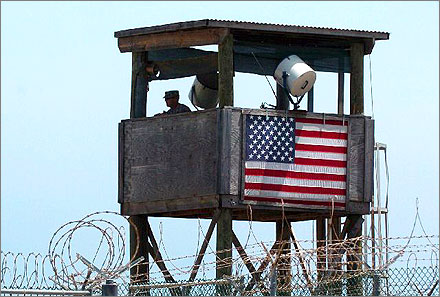
A loyal Opposite reader has alerted me to an ABC News story about U.S. military personnel softening-up Uyghur detainees before their interrogation by Chinese visitors at Guantanamo Bay. The news was hidden deep inside a 400+ page report issued this week by the U.S. Department of Justice, detailing the FBI's involvement in the interrogation of detainees in Afghanistan, Iraq, and Gitmo.
I downloaded the report to find the original reference — an extremely difficult task given that the report is only available online in an unsearchable PDF format. I finally found what I was looking for on pg. 183 (which is pg. 226 in the PDF if you end up downloading it yourself). The excerpt here comes from the "Sleep Deprivation or Sleep Disruption" section of a chapter on FBI observations of detainee treatment at Guantanamo Bay:
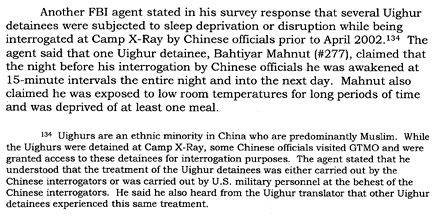
The scariest thing is that the footnote makes it clear that it was likely Chinese interrogators carrying out the sleep deprivation and sensory abuse of Uyghur detainees, under U.S. custody. At the very least, the Chinese were directing the effort to prepare the detainees for an effective interrogation.
I've heard that the brass over at the Pentagon are looking desperately for a way to get out of Guantanamo Bay... perhaps this is part of a secret plan to slowly turn everything over to the Chinese? I'm sure the PLA could whip that place into shape in a Beijing minute.
posted May 23, 2008 at 12:03 AM unofficial Xinjiang time | Comments (69)
May 19, 2008
After Three Minutes of Silence, China Roars
The observation of three minutes of silence across China at 2:28pm today was incredibly powerful. Standing silently at work with my Chinese colleagues, the eerie sound of sirens and car horns filling Beijing... I got a tingle up my spine. We were watching CCTV, and the images of rescuers standing at attention forced all of us to reflect on what has, by now, become an operation to retrieve tens of thousands of bodies buried beneath the bricks and concrete.
Later in the day, someone told me that people had been crying on the streets, and that no one had dared to move.
After three minutes of silence, CCTV switched over to live shots from Ti@nanmen Square, where what appeared to be a few thousand people had begun shouting slogans. Their cries were slightly nationalist in tone — long live China! 中国万岁! — but understandably so at a time of great national tragedy.
I couldn't help thinking that it must have been a long time since so many people shouted "long live" anything (or anyone) across from the Gate of Heavenly Peace, fists pumping the air in unison. When would that have been? Seriously... any educated guesses?
posted May 19, 2008 at 03:52 PM unofficial Xinjiang time | Comments (83)
May 16, 2008
Urumqi Map. Sweet!
I wish somebody had thought to make an interactive online map of Urumqi (乌鲁木齐) a few years ago. It would have been more useful to me, personally, when I was still living in Xinjiang. In any case, the boys over at The New Dominion have created something of great use to the hordes of tourists who'll be passing through Urumqi this summer.
Now if they just add some pinyin addresses, almost anyone will be able to make their way around a city where I still somehow get north confused with south.
posted May 16, 2008 at 03:37 PM unofficial Xinjiang time | Comments (31)
May 15, 2008
Dark Humor
I was watching CCTV News last night when this peculiar bit of footage was shown. A reporter was touring the earthquake area on a military helicopter bringing supplies to isolated survivors, when suddenly the crew started tossing boxes out the door. People on the ground below are seen running towards the drop zone.
Now, I'm no physicist, but I've estimated conservatively that it took five seconds for each box to hit the ground and that the chopper was traveling at about 50km/hr. Dusting off my trigonometry, I calculated that the boxes would be moving at more than 180km/hr (110mph) upon impact.
Can a case of water bottles or instant noodles really survive something like that? I doubt it. I remember seeing a quote somewhere yesterday from an annoyed survivor saying all the air-dropped relief supplies had exploded, but I can't find it now.
Anyway, my heart goes out to everyone suffering out west and I think the rescuers are doing a great job, but I find this particularly ill-conceived relief mission darkly humorous. That said, there's nothing funny about the situation in Sichuan.
Click here if you can't see the embedded video above.
posted May 15, 2008 at 12:36 PM unofficial Xinjiang time | Comments (47)
May 14, 2008
Direct Your Fury at Topeka.
 As hope fades for trapped victims of the earthquake disaster in Sichuan, the initial feelings of shock and awe are giving way to a feeling of mass helplessness. Entire cities have been wiped off the map. Roads and communication systems are cut. Millions of people are living in the rain, often with only the clothes on their backs. More than 13,000 are confirmed dead... but I expect the number to rise to somewhere between 50,000 and 100,000 when the final tally is made.
As hope fades for trapped victims of the earthquake disaster in Sichuan, the initial feelings of shock and awe are giving way to a feeling of mass helplessness. Entire cities have been wiped off the map. Roads and communication systems are cut. Millions of people are living in the rain, often with only the clothes on their backs. More than 13,000 are confirmed dead... but I expect the number to rise to somewhere between 50,000 and 100,000 when the final tally is made.
The government's response to the disaster, while unable to save many people, has generally been praised both here in China and internationally. Still, there are a few signs of fury... some wonder why government buildings remain standing while schools and hospitals were pulverized into dust. Others are trading in false rumors that warning signs were ignored.
I don't buy into the blame game. It's not as if anyone can analyze a bunch of wayward toads or a drained lake and start an evacuation of, what, all southern China? And construction is shoddy all over China, so how you can anyone put the blame on government authorities? China is hardly alone in cutting corners when figuring out how to house the population of a developing nation, and builders all over the world routinely circumvent structural codes to save a few bucks.
Who, then, should be targeted by Chinese netizens looking to vent their anger and frustration over the huge loss of human life? May I recommend the Westboro Baptist Church in Topeka, Kansas:

The recent hubbub over the Olympic torch relay showed that the Chinese can protest just as well — if not better — than anyone else around the world.
So, if you're someone out there looking to make a display of China's strength and unity, why not give the WBC a piece of your mind (or perhaps something more tangible)? Besides the disgusting statement issued above, the WBC has in the past also praised god for this past winter's deadly storms, and has vowed to hold a protest at the Beijing Olympics.
I've never been able to figure out why the Westboro Baptist Church is allowed to exist in the United States. Yes, I'm familiar with the First Amendment, but I'm not talking about legal remedies... I wonder why some angry person over the years hasn't taken matters into their own hands. This is a group, after all, that protests at dead soldiers funerals. I'm no supporter of the Iraq War, but what the f#%&?!?
So, my question for all the Chinese people out there is: what are you going to do about the Westboro Baptist Church's disrespectful and hateful language towards China and the victims of the Sichuan earthquake? Someday, somebody is going to have to stand up to these assholes.
posted May 14, 2008 at 01:03 PM unofficial Xinjiang time | Comments (238)
May 04, 2008
Don't Be Like "CNN"
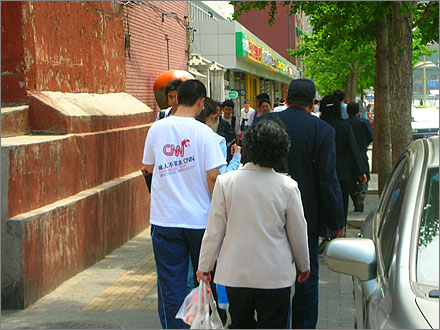
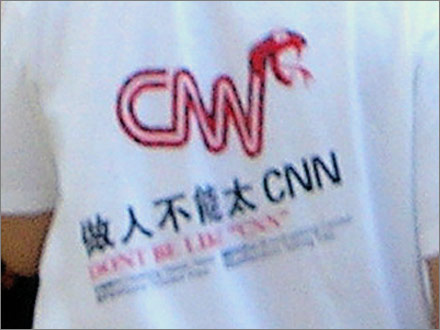
I stepped out of my apartment building today just as someone walked by wearing an anti-CNN t-shirt... a piece of clothing much rumored on the Internet, but this is the first one I've actually seen. (Though I have seen plenty of ♥CHINA and I♥北京 t-shirts recently.) The young Chinese patriot was walking away from me rather quickly when I spotted him, which explains why the photo is blurred and poorly composed. Anyone else out there had any anti-CNN street sightings?
posted May 04, 2008 at 08:10 PM unofficial Xinjiang time | Comments (67)
May 01, 2008
Autonomy & Harmony
 From time to time, the state-run Xinhua News Agency publishes white papers, backgrounders, and other informative documents on a wide range of subjects. A new backgrounder on China's system of regional autonomy for ethnic minorities came out yesterday, part of the larger effort to portray the march of progress as a series of positive developments rather than cultural genocide. An unwritten rule of thumb in the Chinese press is that almost anything can be proven by a large number of unrelated and meaningless statistics, thus we get:
From time to time, the state-run Xinhua News Agency publishes white papers, backgrounders, and other informative documents on a wide range of subjects. A new backgrounder on China's system of regional autonomy for ethnic minorities came out yesterday, part of the larger effort to portray the march of progress as a series of positive developments rather than cultural genocide. An unwritten rule of thumb in the Chinese press is that almost anything can be proven by a large number of unrelated and meaningless statistics, thus we get:
Through 2007, China had established 155 ethnic autonomous areas. Of these, five were autonomous regions, 30 autonomous prefectures and 120 autonomous counties.
Among the country's 55 ethnic minorities, 44 have autonomous areas covering 75 percent of the total ethnic minority population.
The sixth census in 2005 showed China had a population of more than 1.3 billion. Han people accounted for 90.56 percent and ethnic minorities 9.44 percent. Compared with the 2000 census, the population of ethnic minorities increased by 15.88 percent, much higher than the Han's 2.03 percent.
After 61 years of this system and 30 years of reform and opening-up, rapid economic and social progress have been made in these autonomous regions, accounting for 64 percent of the country's total area.
In 2006, the gross domestic product (GDP) of the five autonomous regions and Yunnan, Guizhou and Qinghai, three provinces densely populated by ethnic minorities, exceeded 2 trillion yuan (289 billion U.S. dollars), an annual increase of 13.2 percent from 2002.
In 2006, the number of impoverished people decreased from 132.2 million to 121.1 million.
Starting in 2007, the country had allocated 180 million yuan annually to develop its frontier counties where many ethnic minorities reside.
That's a lot of f$%#in' numbers! If you take a closer look you'll see that none of the figures tell you anything consequential about life for China's minorities... yet somehow, taken together these numbers give off a soft, rosy glow. Everything boils down to a foregone conclusion:
The implementation of this policy is critical to enhancing the relationship of equality, unity and mutual assistance among different ethnic groups, to uphold national unification and to accelerate the development of places where regional autonomy is practiced and promoting their progress.
After 61 years, the autonomy system has proved a wise choice to promote harmonious relations between people of various ethnic groups. The government will stick to this system, an important component of the country's political mechanism, and bring peace and prosperity for all Chinese.
The bit about "national unity" reminded me of some old clips from the Los Angeles Times I had lying around. One of the earliest efforts to ensure "national unity" out in western China came in 1957, when Beijing ordered the written form of the Uyghur language switched from the Arabic alphabet to Cyrillic text, based on the Soviet system used by Kazakhs, Uzbeks, etc. In 1960, with the Sino-Soviet relationship in tatters, another change was ordered:

As you can imagine, the switch from Arabic to Cyrillic to Latin text did little to promote "national unity". The major effect of the change was to encourage opposition from ethnic minorities in Xinjiang. By 1965, language reform still hadn't made much progress:
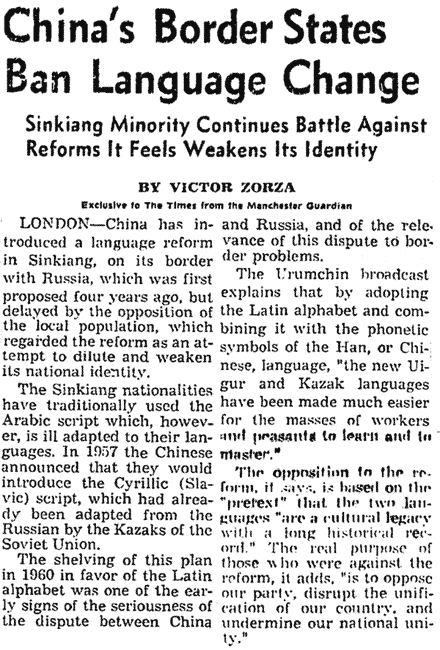
Confusion in the education system also ensured that an entire generation of Uyghurs was cut-off from their own written culture. The effort to Latinize all minority languages was finally given up sometime after the Cultural Revolution, but there are still many educated, middle-aged adults in Xinjiang (and Tibet) who aren't fully literate in their own language.
It's no secret that real and/or meaningful autonomy is elusive for the residents of China's so-called autonomous regions. Truthfully, most ethnic minorities are caught somewhere between their admiration for the benefits brought by development and a fear — based on lessons from history and more recent efforts perceived to weaken minority culture — that assimilation is causing a slow cultural death.
It's clear to me that China will be a stronger, more unified country only when it acknowledges the harm done to its ethnic minorities in the past. I'm all for letting bygones be bygones, but that isn't going to happen in Xinjiang (or Tibet) without an effort by the government to ensure minorities that their grief is understood. Either that, or China can wait 40 years until everyone who remembers their faded culture is dead... just like Moses.
Backgrounder: Regional autonomy for China's ethnic minorities
30 April 2008
Xinhua News Agency
(c) Copyright 2008 Xinhua News Agency
BEIJING, April 30 (Xinhua) -- Regional autonomy for ethnic minorities is an important policy of Chinese government in handling ethnic affairs.
The Inner Mongolia Autonomous Region, established in 1947, is the first autonomous region for ethnic minorities in China. It was followed by the Xinjiang Uygur, Guangxi Zhuang, Ningxia Hui and Tibet autonomous regions.
Regional autonomy for ethnic minorities in China means that, under the unified leadership of the state, regional autonomy is practiced in areas where people of ethnic minorities live in compact communities. In these areas, organs of self-government are established for the exercise of autonomy.
China is a united multi-ethnic state with a long history. Almost all the central authorities of the feudal dynasties adopted a policy of "rule by custom" towards the ethnic minorities. Under this policy, the political unification of the country was maintained while the ethnic minorities were allowed to preserve their own social systems and cultures.
The first National People's Congress that convened in 1954 included the system of regional autonomy for ethnic minorities in the Constitution of the People's Republic of China. The Law of the People's Republic of China on Regional Ethnic Autonomy, issued in 2001, explicitly stipulates the "system of regional autonomy for ethnic minorities is a basic political system of the State".
Through 2007, China had established 155 ethnic autonomous areas. Of these, five were autonomous regions, 30 autonomous prefectures and 120 autonomous counties.
Among the country's 55 ethnic minorities, 44 have autonomous areas covering 75 percent of the total ethnic minority population.
The sixth census in 2005 showed China had a population of more than 1.3 billion. Han people accounted for 90.56 percent and ethnic minorities 9.44 percent. Compared with the 2000 census, the population of ethnic minorities increased by 15.88 percent, much higher than the Han's 2.03 percent.
After 61 years of this system and 30 years of reform and opening-up, rapid economic and social progress have been made in these autonomous regions, accounting for 64 percent of the country's total area.
In 2006, the gross domestic product (GDP) of the five autonomous regions and Yunnan, Guizhou and Qinghai, three provinces densely populated by ethnic minorities, exceeded 2 trillion yuan (289 billion U.S. dollars), an annual increase of 13.2 percent from 2002.
In 2006, the number of impoverished people decreased from 132.2 million to 121.1 million.
Starting in 2007, the country had allocated 180 million yuan annually to develop its frontier counties where many ethnic minorities reside.
By the end of 2007, the nine years of compulsory education for children had been realized in 330 counties in western China, making up 88.7 percent of the total counties in western China. The implementation of this policy is critical to enhancing the relationship of equality, unity and mutual assistance among different ethnic groups, to uphold national unification and to accelerate the development of places where regional autonomy is practiced and promoting their progress.
After 61 years, the autonomy system has proved a wise choice to promote harmonious relations between people of various ethnic groups. The government will stick to this system, an important component of the country's political mechanism, and bring peace and prosperity for all Chinese.
Los Angeles Times, February 16, 1960:
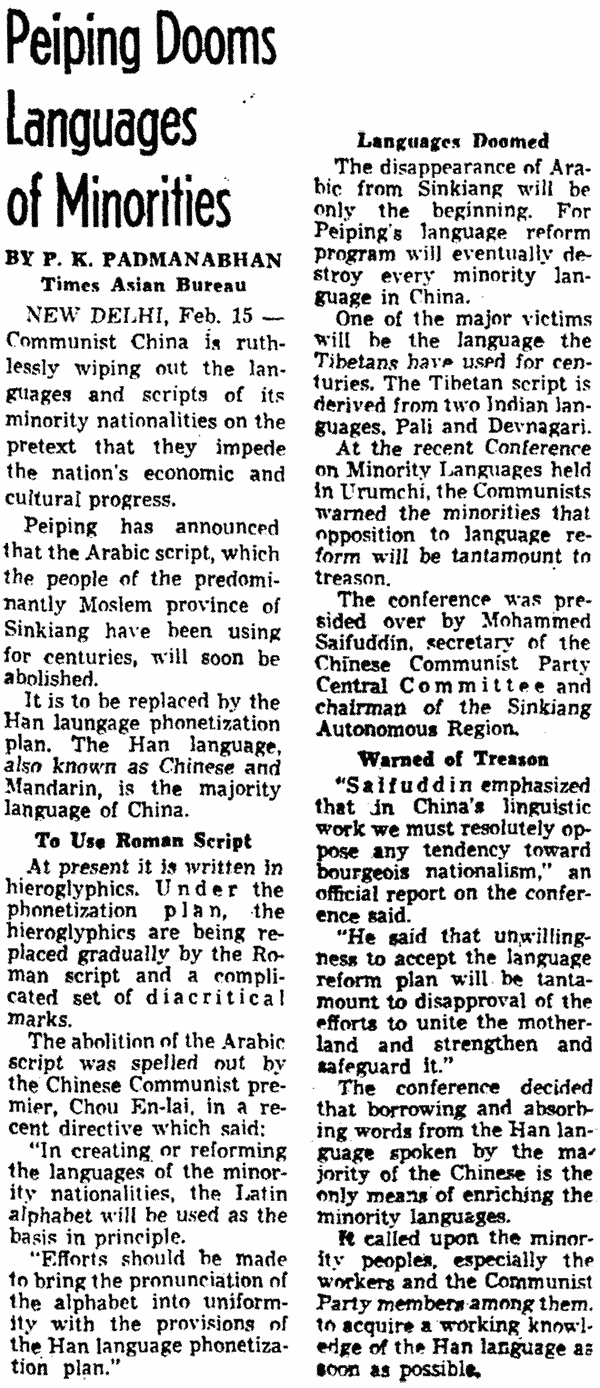
Los Angeles Times, April 2, 1965:
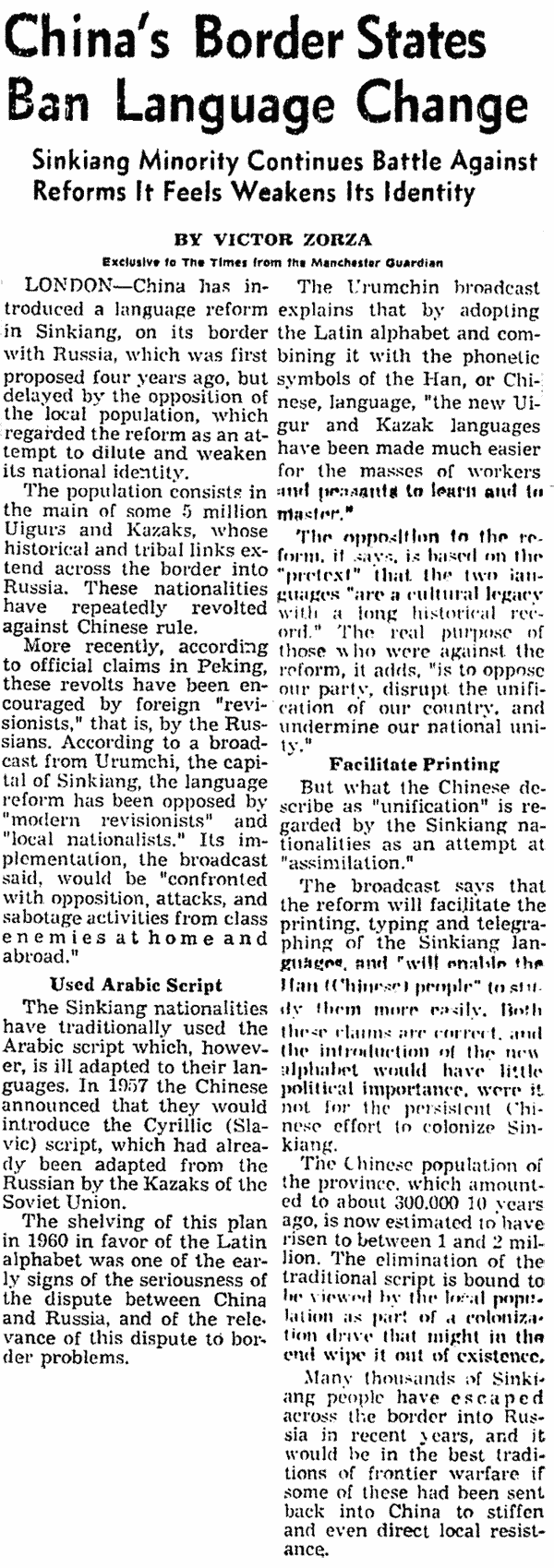
posted May 01, 2008 at 01:38 PM unofficial Xinjiang time | Comments (62)
